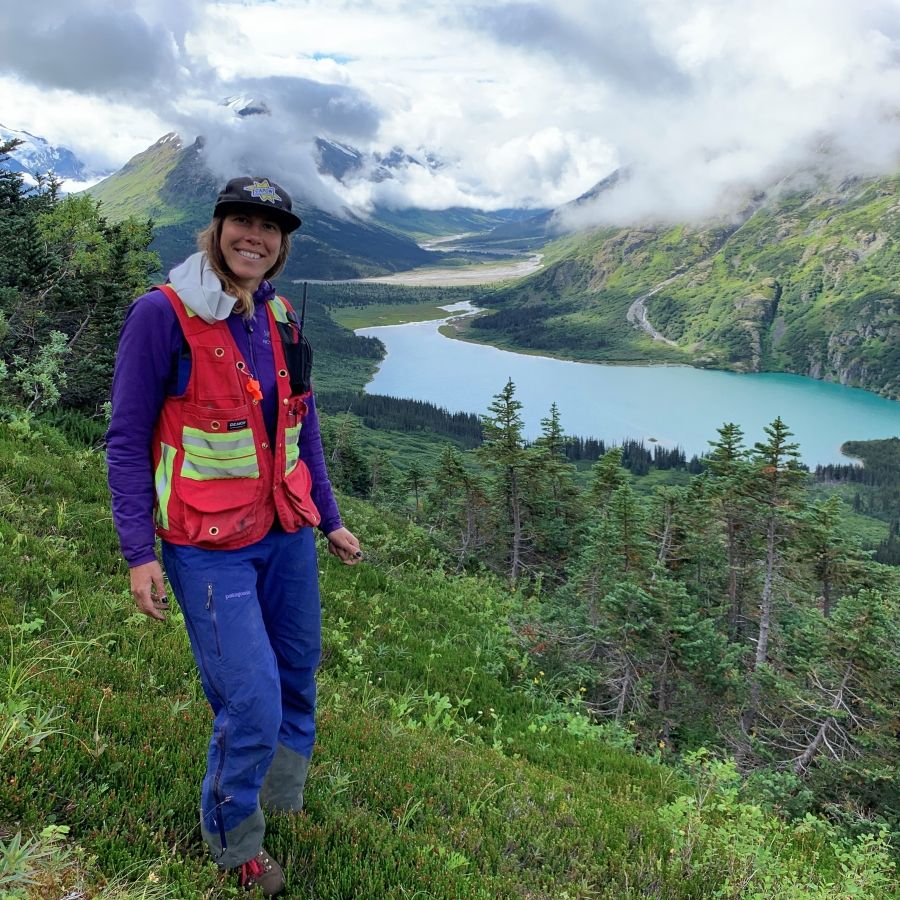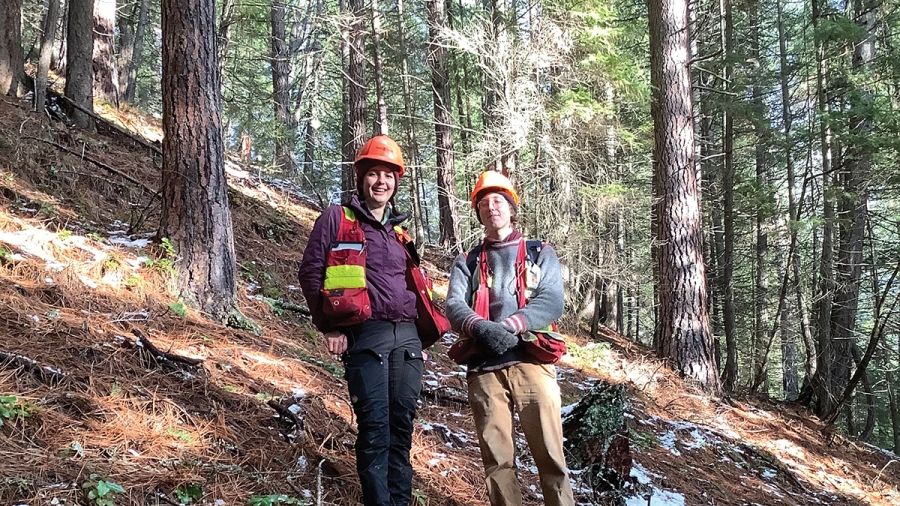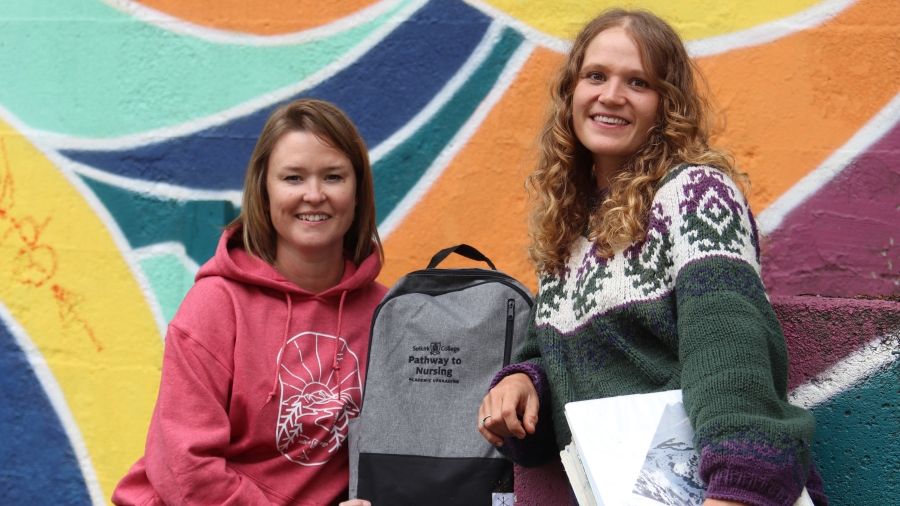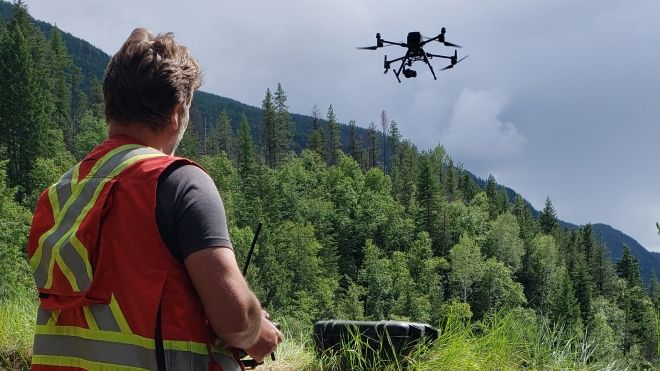Applied Environmental Science and Planning Technology - Diploma
Overview
Do you have an interest in protecting land, natural resources and the environment? Do you like hands-on learning in the field and in the lab? If your answer is yes, then our leading-edge Applied Environmental Science and Planning Technology (AESP) Program is a great fit. You’ll acquire interdisciplinary, employment-ready skills to tackle today’s environmental challenges and develop a range of applied environmental skills and technologies.
This program prepares students to meet the growing need for technologists capable of assisting in all areas of land use and environmental planning, environmental chemistry, hydrology, applied ecology, microbiology and geographic information systems (GIS). Graduates possess the practical field and laboratory skills and technical competencies to acquire, compile, analyze, evaluate and present environmental information and to integrate it effectively into formal planning and review processes.
Courses cover a range of topics, including botany, soil science, hydrology, surveying, ecology, fish and wildlife, GIS, ecological restoration, First Nations, air and water pollution chemistry, environmental planning, microbiology and sustainability.
*This program may be eligible for the post-graduation work permit (PGWP).

Accreditation
The AESP Program is nationally accredited through National Accreditation: Technology Accreditation Canada (TAC) and Provincial Accreditation: College of Applied Biologists.
To help ensure the program is assessed for quality industry outcomes, relevancy and currency, the program is updated continuously based on feedback from our Program Advisory Committee consisting of industry, government, Indigenous representation and past graduates.
Transferability
Many of our graduates seek meaningful, relevant employment while others choose to transfer to universities to complete a degree. The AESP Program transfers to the Bachelor's Degree in Geographic Information Systems (BGIS) here at Selkirk College.
Selkirk College also has direct transfer arrangements with other universities in BC:
- Thompson Rivers University (TRU), Bachelor of Natural Resource Science
- British Columbia Institute of Technology (BCIT), Bachelor of Science in Ecological Restoration
- University of Northern BC, Bachelor of Planning
- Royal Roads University, Bachelor of Environmental Science
It is recommended that students consult with the program advisor of the receiving institution to ensure they have met all the necessary transfer requirements.
Common Core
The first year of AESP consists of a core of environmental courses in soils, hydrology, botany, surveying, fish and wildlife, ecology, mapping, communications, computers and math. This core year is common with the Forest Technology and Recreation, Fish & Wildlife programs.
The second year of the program synthesizes the skills, knowledge and professionalism of first year and ladders into planning, sustainability and more advanced environmental science classes.
News
Program Outcomes
Upon successful completion of this program, learners will be able to:
1. Demonstrate professional ethics and competencies as environmental technologists
2. Integrate ecological knowledge to assess environmental conditions
3. Analyze the hydrology and ecology of the atmosphere, rivers, lakes, watersheds, and groundwater
4. Apply environmental procedures for monitoring air, water, sediment, and biological media
5. Apply environmental assessment, mitigation, remediation, and restoration techniques
6. Collect, evaluate, and summarize ecological and geospatial data
7. Design and implement a planning framework for identifying and addressing land use, environmental and social challenges, and opportunities across a variety of landscapes
8. Engage with a variety of audiences using diverse communication approaches including written, verbal, numeric, and graphic
9. Model strategies to encompass emerging science, technologies, regulatory environments, and societal shifts including climate change and mitigation, green energy, carbon accountability, and the UN Sustainable Development Goals
10. Recognize the diversity of Indigenous Nations’ cultures and traditions as distinct knowledge systems that are valid and critical to building meaningful engagement, consultation, and collaborative relationships
11. Acknowledge the calls to Truth and Reconciliation and the United Nations’ Declaration on the Rights of Indigenous Peoples as inclusive and informed constructs for Indigenous rights and title in the stewardship of land, air, water, and all living things
Admission Requirements
In addition to meeting the general admission requirements to Selkirk College, the applicant must meet the following Environment and Geomatics Programs requirements to be considered fully-qualified:
Successful completion of these high school or equivalent courses:
- Foundations of Mathematics 11 with a minimum of 67% or higher
- Any BC Science Curriculum (with a lab component) at the grade 11 or 12 level with a minimum of 67%
- English Studies 12, English First Peoples 12, or ENGL 60 with a minimum of 67% or higher
NOTE: Applicants in Grade 12 at the time of application must show proof of registration or completion of the above courses.
Applicants that do not meet the above listed minimum requirements may still gain provisional acceptance for program seats if they can show proof of registration in prerequisite high school courses. Completion of these prerequisite courses must occur by July 31 before Fall Term start date.
Computer competency is an important element of success in the program. Prior to starting the program, it is strongly recommended that students have entry-level experience with word processor, spreadsheet and web-browsing software. Check out Selkirk College Community Education & Workplace Training computer courses.
General
Applicants must submit a completed application form and other required documents (i.e. secondary school and any post-secondary transcripts, application package) to the Registrar’s office.
(i) One or more of the following or equivalent are recommended but not required for admission:
(a) Class 5 Driver's License
(b) Chemistry 11 and 12
(ii) Most learning activities within the program reflect industry norms. A demonstrated interest in, and aptitude for, outdoor work is essential as much of the work is done in the field, often under adverse weather and topographic conditions. Training often occurs in front and back country wilderness terrain. Therefore, applicants should be in good health and physical condition. Activities will be taught which require student participation working outside for up to 8 hours per day. Students will be required to traverse over rough, sometimes difficult terrain in all weather conditions. Activities in which the students participate may include hiking, snowshoeing, cross country skiing. Other activities may include touring and observing active industrial operations. Students will be required to observe all required and standard safety practices and procedures at all times.
APPLICATION PROCESS
The Application process is complete and admission to first year will be considered with:
1. Receipt of the "Application for Admission" form plus the required application fee, and;
2. Receipt of official high school and post-secondary education transcript(s) or interim transcript or proof of registration in prerequisite courses (if in Grade 12), and;
3. The date when an applicant's file is complete is the date when all the requirements of a) and b) above have been fulfilled.
CHANGE OF PROGRAM
There is some limited availability for students to change programs in the first year however, the following conditions must be met:
1. Students who want to change programs must apply in writing to the School Chair before January 15th during the first year of their original program.
2. Program changes will only be permitted provided there is space as determined by the School Chair.
3. Students may need to complete prerequisite courses prior to the beginning of the second year.
PROMOTION
1. Promotion to Subsequent Semester
Each semester must be completed with a Grade Point Average of 2.00 or better with no more than two grades below a 60% to continue into the next semester. GPA will be based on all grades for courses scheduled for a given year and semester as per the course calendar.
2. Admission Requirements - Second Year
All first-year courses must be completed with a grade of 60% or better before a student is admitted to the second year of their program. Students in this situation should contact the School Chair.
3. Prerequisite Courses
Students receiving a final grade of lower than a 60% in a prerequisite course will not be able to register in the subsequent course requiring the prerequisite. Students in this situation must re- register in, and successfully complete the course with a minimum grade of 60% before going on to the subsequent course.
GRADUATION
Credentials:
i. A cumulative GPA of 2.0 and a minimum grade of 60% in all courses in the program is required for graduation.
ii. A student will be expected to complete the requirements for a diploma within a maximum of four years from the initial admission.
iii. No diploma will be awarded without meeting all obligations to the College. This includes returning all equipment signed out and paying all outstanding fees.
b. Types of Credential Received
Diploma – Applied Environmental Science and Planning Technology
Note: New credential applies to Fall 2023 intake and going forward.
c. Requirements: (see Policy 8617: Graduation)
Certificates: All students strongly recommended to have a valid Worksafe BC approved first aid certificate at the time of graduation. These courses are offered throughout the year through Selkirk College Community Education & Workplace Training.
CO-OP EDUCATION
This program is eligible for co-op education opportunities. Co-op education courses will provide students with documented, program relevant work experience that is recognized with a designation on their transcript.
Please refer to Policy 8370 Selkirk College Co-operative Education and Selkirk College Co-operative Education Procedures for additional information regarding Co-op Education at Selkirk College.
In order to receive your credential in your program, you must maintain a minimum GPA of 2.00.
Courses
ENVR150 - Hydrology I
ENVR 150 Hydrology I is an introductory study of water in our environment including its properties, the natural processes which affect it, and climate and weather. Students will gain practical experience in the collection and analysis of field and laboratory data using standard techniques and equipment.
ENVR160 - Surveying and Field Measurements
ENVR 160 Surveying and Field Measurements is an introduction to the practical use of common survey instruments and techniques used by Environmental technicians. As well, the course will introduce the student to various sampling methods used to collect, assess, classify, and evaluate field data. Emphasis is placed on the proper care and use of basic surveying and measurement tools and the skills involved in collecting and interpreting precise and accurate field data.
ENVR162 - Applied Botany and Ecosystem Classification
ENVR 162 Applied Botany and Ecosystem Classification is an introduction to the principles of Botany and Ecosystem Classification. Botany lectures will focus on plant classification, botanical terms, plant morphology, and plant physiology. Topics include: plant cell structure, plant tissue function and structure, photosynthesis and respiration, transpiration and translocation. Botany labs will focus on learning to identify about 100 native plants commonly found in the West Kootenay Region of B.C., specifically key indicator species. Ecology lectures will focus on ecosystem classification using the Biogeoclimatic Ecosystem Classification System (BEC) of B.C. Other key topics include the study of climatic factors, disturbance and succession, landscapes and stand structure. Ecology labs focus on classifying ecosystems (including soils, site and vegetation) to site series using BEC. Labs are mainly field based.
ENVR164 - Soil and Earth Sciences
ENVR 164 Soil and Earth Sciences will cover the identification of common rocks and minerals, landforms and soils of British Columbia. Learners will be introduced to the study of physical geology and geomorphology in relation to management of the forest environment and landscape. Learners will gain skills and knowledge in rock and mineral identification, description of the physical and chemical qualities of soils, and identification and classification of landforms and terrain. Skills will also be developed with respect to interpretation of geology, landforms and soils for environmental management.
ENVR190 - Computer Applications in Natural Resource Management
ENVR 190 Computer Applications in Natural Resource Management. This introductory course builds on students' basic computer skills, focusing on applications relevant to careers in the environment and geomatics sectors. Students will learn to organize and manage files, create presentations and graphics, and develop spreadsheet skills. The course also covers formatting professional documents, setting up data collection on tablets, and transferring data between systems. Emphasis is placed on applying these skills to real-world tasks and demonstrating professionalism in digital work.
MATH160 - Technical Math Review
MATH 160 Technical Math Review is a mathematical review course for first-year students in the School of Environment and Geomatics (SEG) diploma programs. This course will provide a review of mathematical concepts which you will need for your other SEG courses. Materials to be covered include: unit conversions, trigonometry, exponentials and logarithms, problem solving, slope calculations, distance and direction calculations.
TWC150 - Introduction to Technical Writing and Communications I
TWC 150 Introduction to Technical Writing and Communications I is an introduction to general principles in written technical communication and their application to environmental concerns and workplace communication. Classroom sessions focus on developing writing skills, the organization and presentation of data, basic report formats, and job search techniques.
ENVR154 - Maps and Navigation
ENVR 154 Maps and Navigation focuses on the navigation skills required of technologists working outdoors to locate oneself, stay ''found'', and return safely from the field. The course includes hands-on use of navigation tools in field settings including map, compass, aerial imagery, altimeter, and Global Positioning System (GPS). Pre-trip planning in a navigation context will also be covered including developing access plans and route plans, and estimating travel times.
ENVR158 - Introduction to Geomatics
ENVR 158 Introduction to Geomatics is an introduction to applied mapping and geographic information systems (GIS) theory and applications. The first half of the course will be focused on introducing basic uses of remotely sensed imagery and exploring applied mapping technologies, including Google Earth and Internet Mapping websites. The second half of the semester will be focused on learning basic Geographic Information System concepts and applying GIS technologies to environmental, renewable resource management, and planning fields. Emphasis will be placed on how geographic data is represented, collected, managed, analyzed, and displayed using GIS tools. Hands-on experience will be developed with desktop GIS software, ESRI's ArcGIS for Desktop.
ENVR163 - Terrestrial Ecology and Biology
ENVR 163 Terrestrial Ecology and Biology builds upon the concepts from ENVR 162 with further studies of local forest ecosystems. Students will identify key forest structural components and study the role that disturbance (such as fire), environmental gradients, and competition play in defining a species' niche. Participants will also examine the role of primary and secondary growth, nutrient uptake, reproduction, and survival mechanisms for plants. Winter plant identification, ecosystem form and function, and plant adaptations to timberline will also be examined. A practical field based assignment will form a major portion of the term assessment. This project includes collecting the data in the field, entering and analyzing the data in the computer lab, and presenting the data in a written scientific report.
ENVR170 - Fish and Wildlife Ecology
ENVR 170 Fish and Wildlife Ecology is designed to introduce students to the general ecological principles, taxonomy and management of fish and wildlife in British Columbia.
MATH190 - Resource Statistics I
MATH 190 Resource Statistics I is an introductory applied statistics course for environment and geomatics students. Topics include: types of data, descriptive statistics, probability and random variables, discrete probability distributions, continuous probability distributions, confidence intervals, sample size, and hypothesis testing.
TWC151 - Introduction to Technical Writing and Communications II
TWC 151 Introduction to Technical Writing and Communications II is an introduction to general principles in written scientific communication, research strategies, and oral presentations. Lectures and in-class writing focus upon research strategies, the formal report, technical style, and graphic illustration. Students practice delivery techniques for oral presentations and learn research skills for research report preparation.
AESP276 - Ecological Restoration and Remediation
AESP 276 Ecological Restoration and Remediation will cover applied ecological restoration and remediation techniques common in the environmental planning and management fields. Restoration project planning and implementation will follow techniques developed by the International Society for Ecological Restoration (SER). Topics covered will include restoration research, project scoping and plan development, field data collection, plant propagation techniques, project implementation in the field, routine and intensive monitoring, and report preparation. Learners can expect to be in the field every day and working on data collection and synthesis during the evenings. This is an intensive 32-hour course offered in a one-week time block in the spring semester.
AESP277 - Environmental Planning Field Applications
AESP 277 Environmental Planning Field Applications involves the development of a planning project in a local regional district. Learners will be involved in scoping of the environmental planning issues, stakeholder consultation, and design of critical planning elements. This is an intensive 35-hour course offered in a one-week time block in the spring semester.
AESP200 - Field Trip Study
AESP 200 Field Trip Study is delivered during the 4th semester of the IEPT program. The field trip provides an opportunity for students to observe current environmental management practices, ecosystems and resource management issues in other regions of the province. Students will be actively involved in trip planning and will be presented with opportunities to develop communication skills and professionalism. This course is available only to students registered in the second year of the AESP Program. Students may be required to pay for accommodation and meals during the trip.
AESP250 - Environmental Planning Applications I
AESP 250 Environmental Planning Applications I is the first course in a two course Integrated Environmental Planning Applications continuum. It focuses on the development of professional land use and environmental planning skills and their practical application. Using a combination of classroom interactive lectures and weekly field based labs, the physical, on the ground, aspects of development and conservation planning are a primary focus of this course. The course also emphasizes the understanding and development of practical strategies to achieve land use and environmental planning objectives.
Plan development and plan implementation, regulatory agencies and regulations, planning history, group process and methods for the practical application of landscape ecology and conservation development are also covered. Students are expected to attend class and labs regularly and contribute actively and evenly to in-class
discussions.
AESP260 - Systems Ecology
AESP 260 Systems Ecology is an introduction to the science of ecology, building on concepts and information introduced in ENVR 160, 161 and other first year ENVR courses. Emphasis is placed on the basics of ecology, and will focus on the structure and function of various communities including alpine, subalpine, wetland, and riparian ecosystems. The labs will explore various methods of sampling, analyzing and reporting on the physical site factors, vegetation and wildlife components of these communities.
AESP270 - GIS Applications I
AESP 270 Geographic Information Systems (GIS) provide the capability to effectively create, edit, display, manage and analyze spatial data; data that is georeferenced to the earth. This course introduces the fundamental concepts and applications of GIS with a specific focus on environmental planning subjects. Emphasis is placed on developing hands-on expertise with world leading commercial desktop GIS software (ArcGIS) for displaying and querying spatial data, manipulating tabular data, completing queries, developing charts and producing effective map layouts. Finally, this course incorporates digital data collection using mobile technologies.
AESP280 - Environmental Chemistry
AESP 280 Environmental Chemistry is an introductory environmental chemistry course designed to equip students with the foundational skills, knowledge and context to begin to assess environmental quality. The course uses water quality assessment and aqueous chemistry to explore basic concepts in chemistry and their environmental application. Laboratory exercises include field and laboratory analysis and are derived from standard methods for the examination of water and wastewater.
MATH291 - Resource Statistics II
MATH 291 Resource Statistics II is a continuation of Math 190 Resource Statistics I. Topics include linear regressions and correlation, inferential statistics, confidence intervals, hypothesis testing, goodness of fit, contingency tables, and ANOVA.
ENVR250 - Indigenous Rights and Environmental Management
ENVR 250 Indigenous Rights and Environmental Management is an introduction to Indigenous cultures and traditional practices as foundational teachings of sustainability. The overarching focus of the course is recognizing and acknowledging Indigenous rights and traditional knowledge as they relate to environmental management.
With a two-eyed seeing approach, topics associated with environmental management will be viewed through the lens of Indigenous Rights and Truth and Reconciliation. The four main overlapping themes of the course are Indigenous cultures & practices, legislation, treaties, and Indigenous vs. Western approaches to environmental management and protection.
AESP251 - Integrated Planning Applications II
AESP 251 Integrated Planning Applications II is the final course in the three course Integrated Environmental Planning Applications continuum. It focuses on the development of professional planning skills and the practical application of the technical skills and scientific knowledge developed in other AESP courses. The majority of each student’s grade is determined by their preparation of a component of the courses capstone project. Preparation of this study takes place in discrete states throughout this course. Plan development, citizen participation strategies, and plan implementation strategies are the major focus of this course. Environmental assessment, planning process, planning theory, and planning ethics are also covered in this course. Students are expected to attend class and labs regularly and contribute actively and evenly to in-class discussions.
AESP255 - Hydrology II
AESP 255 Hydrology II is a continuation of Hydrology I, in which students collect, record and analyze hydrological data for streams, drainage basins, lakes and reservoirs, groundwater and meteorology. Hydrology II is a more in-depth study of the effects of water on our environment, and how we can understand and mitigate our impacts and support natural hydrologic cycles. Practical examples are presented for examination, data collection, analyses, and interpretation in several areas including: snow pack, winter limnology, groundwater, surface runoff, flooding, regulated rivers and meteorology. We will also examine environmental legislation pertaining to hydrology.
AESP266 - Applied Microbiology
AESP 266 Applied Microbiology introduces fundamental microbiological theory and explores the beneficial applications of microbes in food production, environmental monitoring, and industrial processes. Students will learn and apply practical microbiological skills such as aseptic technique, media preparation, food and environmental sampling, cultivation of microorganisms, microbial enumeration for quality control and environmental monitoring, and techniques for the characterization and identification of microbes.
AESP271 - GIS Applications II
AESP (IEP) 271 GIS Applications II provides an opportunity for AESP (IEP) 2nd year students to undertake a GIS project of their choice. Students apply the GIS skills acquired in previous Selkirk GIS courses (ENVR 158 and AESP (IEP) 270) to a real-world project. A range of GIS methods and data sources will be used, depending on student project selection, but all will include as deliverables a project proposal and report, a spatial analysis of some kind, a final map, and a documented geodatabase. Both GIS and project management skills will be developed by completing the steps required to take a GIS project from initial proposal to final map production and report generation.
AESP281 - Water and Air Pollution Chemistry
AESP 281 Water and Air Pollution Chemistry examines the applied chemistry of pollution in the environment. Major topics include an overview of environmental media, source characteristics of common pollutants, groundwater contamination, soil and contaminated sites, water pollution, and air pollution. Emphasis is on monitoring and control of pollutants through the entire pollutant pathway from source to receptor. Applied concepts cover water, soil and air sampling, water and wastewater treatment, assaying and laboratory analysis.
AESP291 - Applied Research Project
AESP 291 Applied Research Project focuses on the preparation of the program's capstone applied research project. The course compliments and is taught in conjunction with AESP 251, Integrated Environmental Planning Applications II. Over the course of the Winter semester, learners prepare a professional quality plan for an outside ''pro-bono'' client. The plan preparation process includes independent research and data collection, consultation with independent experts and stakeholders and public presentation of the draft plans.
AESP290 - Environmental Sustainability and Practice
AESP 290 Environmental Sustainability and Practice delves into the intricate relationship between humankind and the environment, aiming to achieve sustainable development. Through exploration of diverse topics, practical applications, and experiential learning opportunities, students examine strategies for fostering fairness, inclusivity, and positive impact in environmental initiatives, while also gaining an understanding of environmental laws, regulations, and governance structures. This course equips students with applied skills in resource management, energy conservation, renewable energy, and navigating the regulatory landscape in sustainable development and practice.
Tuition & Fees
All amounts are estimates and are subject to change. Tuition amounts are based on a full-time course load. Please note that many programs have additional costs beyond those listed here. For more information, please visit Tuition & Fees.
Find Out More
We look forward to connecting with you! Fill out this form and we'll reach out to you.






